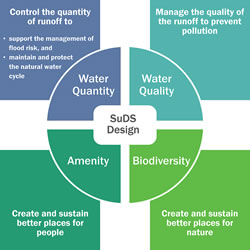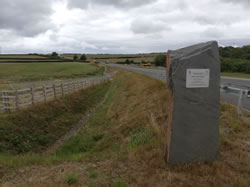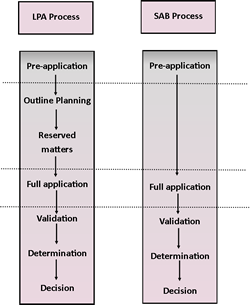
Sustainable Drainage Approval Body (SAB)
Highways & Environmental Services
On 7th January 2019 a new service is being introduced by Ceredigion County Council to deliver new statutory legislation enacted by Welsh Government under the Flood and Water Management Act 2010.

This legislation applies to ALL new developments of more than 1 house or where the construction area is 100m2 or more.
To ensure that compliance is met in Ceredigion, a Sustainable Drainage Body (SAB) has been set up and will manage all the aspects of technical approval of sustainable surface water drainage systems.
SuDS Principles
Surface water flooding has been identified as being a major cause of flooding of property and homes. Not only is the impact of this on our communities distressing and costly, the potential damage to groundwater and rivers from polluted surface water is an issue. To address the issue, Welsh Government has made it mandatory through legislation for developers to incorporate sustainable drainage solutions into design for new developments.

The implementation of Schedule 3 of the Flood and Water Management Act on 7th January 2019 places an obligation on developers to control the effects of surface water runoff. To achieve this, all designs will need to mimic the natural hydrology of each site by keeping water as close to the surface as possible.
The statutory standards introduced by Schedule 3 will aim to:
- Control Quantity – volumes, frequency and flow rates
- Control Quality – prevention and treatment
- Provide Amenity – space, use and wellbeing
- Protect Biodiversity – enhance and protect wildlife
All SuDS designed by developers must be approved by the Local Authority SuDS Approval Body (SAB) before construction begins.
Each Local Authority in Wales has a statutory duty as a Sustainable Drainage Approval Body (SAB) to manage surface water from developments. This means that all compliant developments will need technical approval from the SAB for the design and construction of surface water drainage systems. It is the role of the SAB to assess the design of SuDS against the national standards for sustainable drainage and local policy requirements.
The duty of the SAB is to:
- Evaluate and approve drainage applications where construction work has drainage implications, and
- Adopt and maintain surface water drainage systems according to Section 17 of Schedule 3 (FWMA)
- Inspect and enforce approved systems
- Offer non-statutory pre-application advice
The SAB processes are separate from the Local Planning Authority (LPA) processes and SAB approval is not part of any planning permission sought or granted. All qualifying developments may require both SAB and LPA approval prior to any construction works.
If you are a developer, agent or individual seeking to develop, you may require design approval from the SAB. Some exemptions from obtaining approval do apply and are listed below:
- Single dwelling/house/property/building with a construction area less than 100m2 (0.01 hectares)
- If planning permission was validated before 7th January 2019
- If planning permission was granted before 7th January 2019 (not subject to reserved matters for approval)
- If planning permission was granted with reserved matters for approval and the reserved matters are discharged before 7th January 2020
If you are in any doubt as to whether SAB approval applies, please contact us.
Please note that installing retrospective sustainable drainage systems are likely to be more expensive and are subject to enforcement powers.
The SAB process is completely separate from the planning process, however, the timescales for a SAB decision are designed to fit into those for planning.
 STAGE 1 – Pre-Application
STAGE 1 – Pre-Application
Preparation and planning the site for management of surface water as early as possible is key to meeting the SAB requirements and a layout suitable for planning. It is strongly recommended to take advantage of the pre-application service that is on offer, especially if this is the first time that SAB approval is sought.
There is no timescale for this stage but it is important that adequate time is allowed so that any planning permission deadlines are not compromised by the new requirements of the SAB process.
Planning a strategy for dealing with surface water runoff early will provide better opportunities for low cost solutions to be implemented. Whilst this will save money in the long term, is will also ensure that the requirements from a planning authority perspective do not restrict a suitable drainage design for the whole site.
STAGE 2 – Full Application Validation
A full application will require adequate information to be provided to the SAB before it can be considered for SAB approval. The pre-app service will assist with preparing and collating this information to reduce the risk of delays in obtaining a SAB determination decision. Only once an application is validated, ie all the information required to determine the application has been received in full, will the SAB fee become payable and the timescale for approval begin.
Any fees received for applications that are NOT validated will be returned.
There is no timescale for validating a SAB application.
STAGE 3 – Determination
Once a SAB application has been validated, you will be informed of the date it was validated. This will be done in writing via email or letter directly to the applicant or agent dealing with the application. The default timescale for assessing applications is 7 calendar weeks from the date of validation. This will allow technical checks to take place and statutory consultation responses to be received. If the application is subject to an Environmental Impact Assessment (EIA) under the Town and County Planning (Environmental Impact Assessment) (Wales) Regulations 2017, the timescale for SAB approval is 12 weeks from the date of validation. If you are unsure whether your development requires an EIA you are advised to contact the Local Planning Authority.
Whilst there are statutory timescales for determining an application, the timescale can be extended by agreement in writing. The deadline for determining an application cannot, however, be shortened.
Fees for validated applications that are refused are non-refundable
STAGE 4 – Decision
Once a SAB determination decision has been formally issued, it may contain conditions that will need to be satisfied before full approval is given i.e. SAB Approval subject to conditions.
Conditions may refer to such things as timescales, phasing the construction or carrying out inspections during construction. To discharge any conditions, a Condition Discharge form, found under Downloads, will need to be completed and returned to the SAB.
To enable some or all of the conditions to be discharged in a formal manner, a legal agreement may be necessary between the SAB and the applicant. This will lay out what each party will do, when they will do it and how to do it.
STAGE 5 – Adoption
There is a duty under Schedule 3 of the FWMA for the SAB to ensure that ALL sustainable drainage systems are maintained in the future. This will include ensuring that funding arrangements are in place to achieve this.
For single dwellings where SAB approval applies, the SAB does not have any obligations to adopt and maintain the drainage systems. The SAB will, however, ensure that the system complies with legislation and has a maintenance plan in place for the owner to follow.
For all other approved sustainable drainage systems, and providing the system is installed and functions as designed, the SAB will adopt and maintain the SuDS. A SAB adoption will require prior arrangements to be agreed such as funding arrangements for ongoing maintenance and access. Full legal liability of all SAB approved SuDS will remain with the developer until formal notification is provided by the SAB that the drainage systems has been adopted.
Pre-Applications
A discretionary Pre-Application service is available to advise and assist developers to design sustainable drainage systems in accordance with Schedule 3 of the Flood and Water Management Act 2019. The fee for this service is set by the County Council and the current fee for undertaking this service is available to view on the Fees and Charges 2025-2026 page.
The fee applicable is based on the construction area of the site. This is defined as the plan area of the site where construction will change the drainage characteristics of the ground. This includes driveways, patios, garages, buildings and other hardstanding area. Even if the proposed surface treatment allows water to soak into the ground, a change in the drainage characteristics will be deemed to have changed and should be included as part of the construction area used to calculate the fee payable.
The intention of the pre-app is to identify a suitable drainage strategy for the site prior to detailed calculations or design. All the pre-app information that is suitable for adoption can be referenced during the full application process. This will, in many cases, save time in processing the SAB determination.
Full Applications
All qualifying developments will require a full application to obtain SAB approval. The fees applicable for validating and determining each SAB application are fixed by legislation. Table 2 below shows the scale of fees for a full application SAB submission
| Size of Development (ha) | Fee |
|---|---|
| 0 to 0.099 | SAB Exempt (area less than 100m2) |
| 0.1 to 0.5 | £420 plus £70 per 0.1ha (or part of) |
| 0.5 to 1.0 | £700 plus £50 per 0.1ha (or part of) |
| 1.0 to 5.0 | £950 plus £20 per 0.1ha (or part of) |
| Greater than 5.0 | £1750 plus £10 per 0.1ha (or part of) subject to a maximum of £7,500 |
Table 2
Additional costs for such things as inspections, commuted sums and bonds may be applicable depending upon any conditions attached to a SAB approval or agreement entered into with the SAB.
Contact your SAB
You can contact us in the following ways:
By Post:
Highways & Environmental Services
Penmorfa
Aberaeron
Ceredigion
SA46 0PA
By Telephone: 01545 572572
By Email: sab@ceredigion.gov.uk
Office hours:
Monday to Thursday 8:45 – 16:30 ; Friday 8:45 – 16:00 ; Closed on weekends & bank holidays
